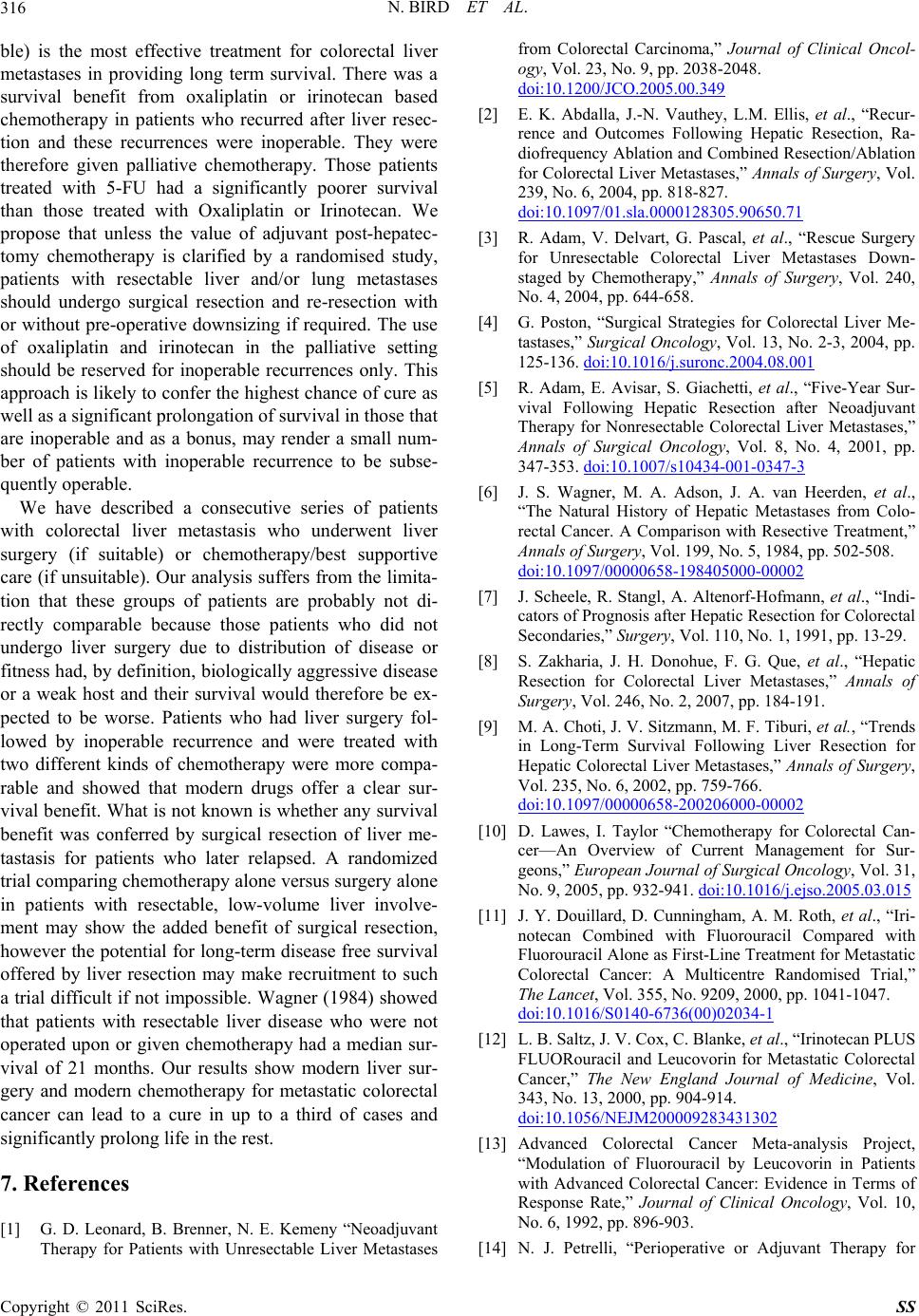
N. BIRD ET AL.
316
ble) is the most effective treatment for colorectal liver
metastases in providing long term survival. There was a
survival benefit from oxaliplatin or irinotecan based
chemotherapy in patients who recurred after liver resec-
tion and these recurrences were inoperable. They were
therefore given palliative chemotherapy. Those patients
treated with 5-FU had a significantly poorer survival
than those treated with Oxaliplatin or Irinotecan. We
propose that unless the value of adjuvant post-hepatec-
tomy chemotherapy is clarified by a randomised study,
patients with resectable liver and/or lung metastases
should undergo surgical resection and re-resection with
or without pre-operative downsizing if required. The use
of oxaliplatin and irinotecan in the palliative setting
should be reserved for inoperable recurrences only. This
approach is likely to confer the highest chance of cure as
well as a significant prolongation of survival in those that
are inoperable and as a bonus, may render a small num-
ber of patients with inoperable recurrence to be subse-
quently operable.
We have described a consecutive series of patients
with colorectal liver metastasis who underwent liver
surgery (if suitable) or chemotherapy/best supportive
care (if unsuitable). Our analysis suffers from the limita-
tion that these groups of patients are probably not di-
rectly comparable because those patients who did not
undergo liver surgery due to distribution of disease or
fitness had, by definition, biologically aggressiv e disease
or a weak host and their survival would therefore be ex-
pected to be worse. Patients who had liver surgery fol-
lowed by inoperable recurrence and were treated with
two different kinds of chemotherapy were more compa-
rable and showed that modern drugs offer a clear sur-
vival benefit. What is not known is whether any su rvival
benefit was conferred by surgical resection of liver me-
tastasis for patients who later relapsed. A randomized
trial comparing chemotherapy alone versus surgery alone
in patients with resectable, low-volume liver involve-
ment may show the added benefit of surgical resection,
however the potential for long-term disease free survival
offered by liver resection may make recruitment to such
a trial difficult if not impossible. Wagner (1984) showed
that patients with resectable liver disease who were not
operated upon or given chemotherapy had a median sur-
vival of 21 months. Our results show modern liver sur-
gery and modern chemotherapy for metastatic colorectal
cancer can lead to a cure in up to a third of cases and
significantly prolong life in the rest.
7. References
[1] G. D. Leonard, B. Brenner, N. E. Kemeny “Neoadjuvant
Therapy for Patients with Unresectable Liver Metastases
from Colorectal Carcinoma,” Journal of Clinical Oncol-
ogy, Vol. 23, No. 9, pp. 2038-2048.
doi:10.1200/JCO.2005.00.349
[2] E. K. Abdalla, J.-N. Vauthey, L.M. Ellis, et al., “Recur-
rence and Outcomes Following Hepatic Resection, Ra-
diofrequency Ablation and Combined Resection/Ablation
for Colorectal Liver Metastases,” Annals of Surgery, Vol.
239, No. 6, 2004, pp. 818-827.
doi:10.1097/01.sla.0000128305.90650.71
[3] R. Adam, V. Delvart, G. Pascal, et al., “Rescue Surgery
for Unresectable Colorectal Liver Metastases Down-
staged by Chemotherapy,” Annals of Surgery, Vol. 240,
No. 4, 2004, pp. 644-658.
[4] G. Poston, “Surgical Strategies for Colorectal Liver Me-
tastases,” Surgical Oncology, Vol. 13, No. 2-3, 2004, pp.
125-136. doi:10.1016/j.suronc.2004.08.001
[5] R. Adam, E. Avisar, S. Giachetti, et al., “Five-Year Sur-
vival Following Hepatic Resection after Neoadjuvant
Therapy for Nonresectable Colorectal Liver Metastases,”
Annals of Surgical Oncology, Vol. 8, No. 4, 2001, pp.
347-353. doi:10.1007/s10434-001-0347-3
[6] J. S. Wagner, M. A. Adson, J. A. van Heerden, et al.,
“The Natural History of Hepatic Metastases from Colo-
rectal Cancer. A Comparison with Resective Treatment,”
Annals of Surgery, Vol. 199, No. 5, 1984, pp. 502-508.
doi:10.1097/00000658-198405000-00002
[7] J. Scheele, R. Stangl, A. Altenorf-Hofmann, et al., “Indi-
cators of Prognosis after Hepatic Resection for Colorectal
Secondaries,” Surgery, Vol. 110, No. 1, 1991, pp. 13-29.
[8] S. Zakharia, J. H. Donohue, F. G. Que, et al., “Hepatic
Resection for Colorectal Liver Metastases,” Annals of
Surgery, Vol. 246, No. 2, 2007, pp. 184-191.
[9] M. A. Choti, J. V. Sitzmann, M. F. Tiburi, et al., “Trends
in Long-Term Survival Following Liver Resection for
Hepatic Colorectal Liver Metastases,” Annals of Surgery,
Vol. 235, No. 6, 2002, pp. 759-766.
doi:10.1097/00000658-200206000-00002
[10] D. Lawes, I. Taylor “Chemotherapy for Colorectal Can-
cer—An Overview of Current Management for Sur-
geons,” European Journal of Surgical Oncology, Vol. 31,
No. 9, 2005, pp. 932-941. doi:10.1016/j.ejso.2005.03.015
[11] J. Y. Douillard, D. Cunningham, A. M. Roth, et al., “Iri-
notecan Combined with Fluorouracil Compared with
Fluorouracil Alone as First-Line Treatment for Metastatic
Colorectal Cancer: A Multicentre Randomised Trial,”
The Lancet, Vol. 355, No. 9209, 2000, pp. 1041-1047.
doi:10.1016/S0140-6736(00)02034-1
[12] L. B. Saltz, J. V. Cox, C. Blanke, et al., “Irinotecan PLUS
FLUORouracil and Leucovorin for Metastatic Colorectal
Cancer,” The New England Journal of Medicine, Vol.
343, No. 13, 2000, pp. 904-914.
doi:10.1056/NEJM200009283431302
[13] Advanced Colorectal Cancer Meta-analysis Project,
“Modulation of Fluorouracil by Leucovorin in Patients
with Advanced Colorectal Cancer: Evidence in Terms of
Response Rate,” Journal of Clinical Oncology, Vol. 10,
No. 6, 1992, pp. 896-903.
[14] N. J. Petrelli, “Perioperative or Adjuvant Therapy for
Copyright © 2011 SciRes. SS